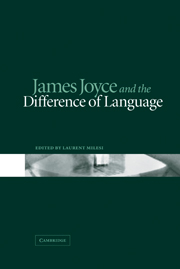Book contents
- Frontmatter
- Contents
- List of contributors
- Acknowledgements
- List of abbreviations
- Chapter 1 Introduction: language(s) with a difference
- Chapter 2 Syntactic glides
- Chapter 3 ‘Cypherjugglers going the highroads’: Joyce and contemporary linguistic theories
- Chapter 4 Madonnas of Modernism
- Chapter 5 Theoretical modelling: Joyce's women on display
- Chapter 6 The lapse and the lap: Joyce with Deleuze
- Chapter 7 ‘sound sense’; or ‘tralala’ / ‘moocow’: Joyce and the anathema of writing
- Chapter 8 Language, sexuality and the remainder in A Portrait of the Artist as a Young Man
- Chapter 9 Border disputes
- Chapter 10 Errors and expectations: the ethics of desire in Finnegans Wake
- Chapter 11 Ex sterco Dantis: Dante's post-Babelian linguistics in the Wake
- Chapter 12 No symbols where none intended: Derrida's war at Finnegans Wake
- Works cited
- Index
Chapter 3 - ‘Cypherjugglers going the highroads’: Joyce and contemporary linguistic theories
Published online by Cambridge University Press: 22 September 2009
- Frontmatter
- Contents
- List of contributors
- Acknowledgements
- List of abbreviations
- Chapter 1 Introduction: language(s) with a difference
- Chapter 2 Syntactic glides
- Chapter 3 ‘Cypherjugglers going the highroads’: Joyce and contemporary linguistic theories
- Chapter 4 Madonnas of Modernism
- Chapter 5 Theoretical modelling: Joyce's women on display
- Chapter 6 The lapse and the lap: Joyce with Deleuze
- Chapter 7 ‘sound sense’; or ‘tralala’ / ‘moocow’: Joyce and the anathema of writing
- Chapter 8 Language, sexuality and the remainder in A Portrait of the Artist as a Young Man
- Chapter 9 Border disputes
- Chapter 10 Errors and expectations: the ethics of desire in Finnegans Wake
- Chapter 11 Ex sterco Dantis: Dante's post-Babelian linguistics in the Wake
- Chapter 12 No symbols where none intended: Derrida's war at Finnegans Wake
- Works cited
- Index
Summary
It is difficult for a modern linguist to confine himself to his traditional subject matter. […] he cannot but share in some or all of the mutual interests which tie up linguistics with anthropology and culture history, with sociology, with psychology, with philosophy, and more remotely, with physics and physiology.
Sapir's account of the early twentieth-century opening up of the field of linguistics to other disciplines is doubly relevant to the theme of this essay, namely the possibility of establishing links between Joyce's fiction and contemporaneous linguistic preoccupations. First, it suggests that an important epistemological change was taking place in linguistics as much as in literature (a change bearing not only on their procedures but also on their relationship to other worlds of discourse). Second, if one substitutes the words ‘Joycean scholar’ and ‘Joyce’ for ‘modern linguist’ and ‘linguistics’ in Sapir's proposition, the result is an equally correct summary of the fertile crossbreeding to which Joyce's fiction has been subjected ever since the publication of Ulysses. The relevance of this fiction to its scientific and cultural environment asserts itself through the numerous links which theoreticians and writers working on Joyce have established with the main cognitive paradigms of the day. Famous early examples are Jung's (somewhat misguided) reading of Ulysses as the embodiment of a schizophrenic mind (JJ 628), and Wyndham Lewis's attack on the same book as a literary equivalent to Freud's and Einstein's theories.
- Type
- Chapter
- Information
- James Joyce and the Difference of Language , pp. 43 - 57Publisher: Cambridge University PressPrint publication year: 2003



